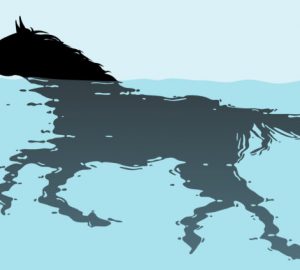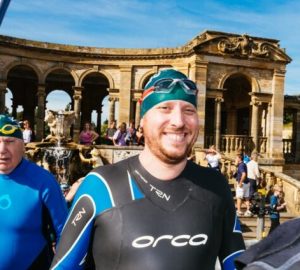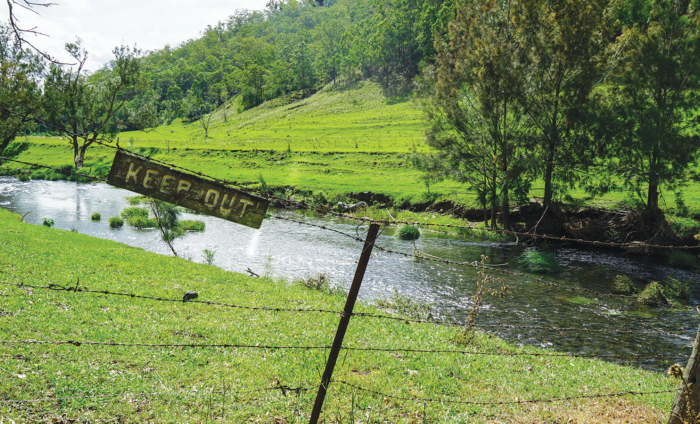
What might newly proposed trespass laws mean for wild swimming?
A massive 92% of the countryside and 97% of rivers are off limits to the public, leaving just 8% for us with the right to roam. Trespass is currently a civic matter, however, will soon become a crime. Ella Foote explores the issue with author and campaigner Nick Hayes.
“There is more damage separating us from nature than any of the damage done by simply entering onto land that you don’t own,” says author and lifelong trespasser Nick Hayes. “Dipping your feet in the water should not be a crime.” Yet if the current government gets its way, it
soon could be.
The majority of the English countryside is out of bounds for most of the population, 92% of the countryside and 97% of rivers are off limits to the public. In all but one tenth of the English landscape, to wander off the footpath, to swim in a river and to explore the countryside, can leave us branded a trespasser and banished from the land. In Nick’s new book, The Book of Trespass: Crossing the Lines that Divide Us, he takes us on a journey over the walls of England and into rivers, woodland, lakes and meadows that are blocked from public access.
Countryside network
Along with his book, Nick is growing a network of ramblers, wild swimmers, paddle-boarders, kayakers, authors, artists and activists. He has launched a campaign with his mate, author and environmental campaigner Guy Shrubsole to stop the criminalisation of trespass and to extend the Countryside & Rights of Way (CRoW) Act in England so that millions more people can have easy access to open space, and the physical, mental and spiritual health benefits that it brings. “Guy and I had always planned that this would be the double punch,” says Nick. “Guy’s book, Who Owns England, came out last year and is like the right hook, my book is like following it up with a left jab. There is this really exciting potential to bring all these groups who are doing their own work on access to the countryside together. They are all doing the work but in their own cells.”
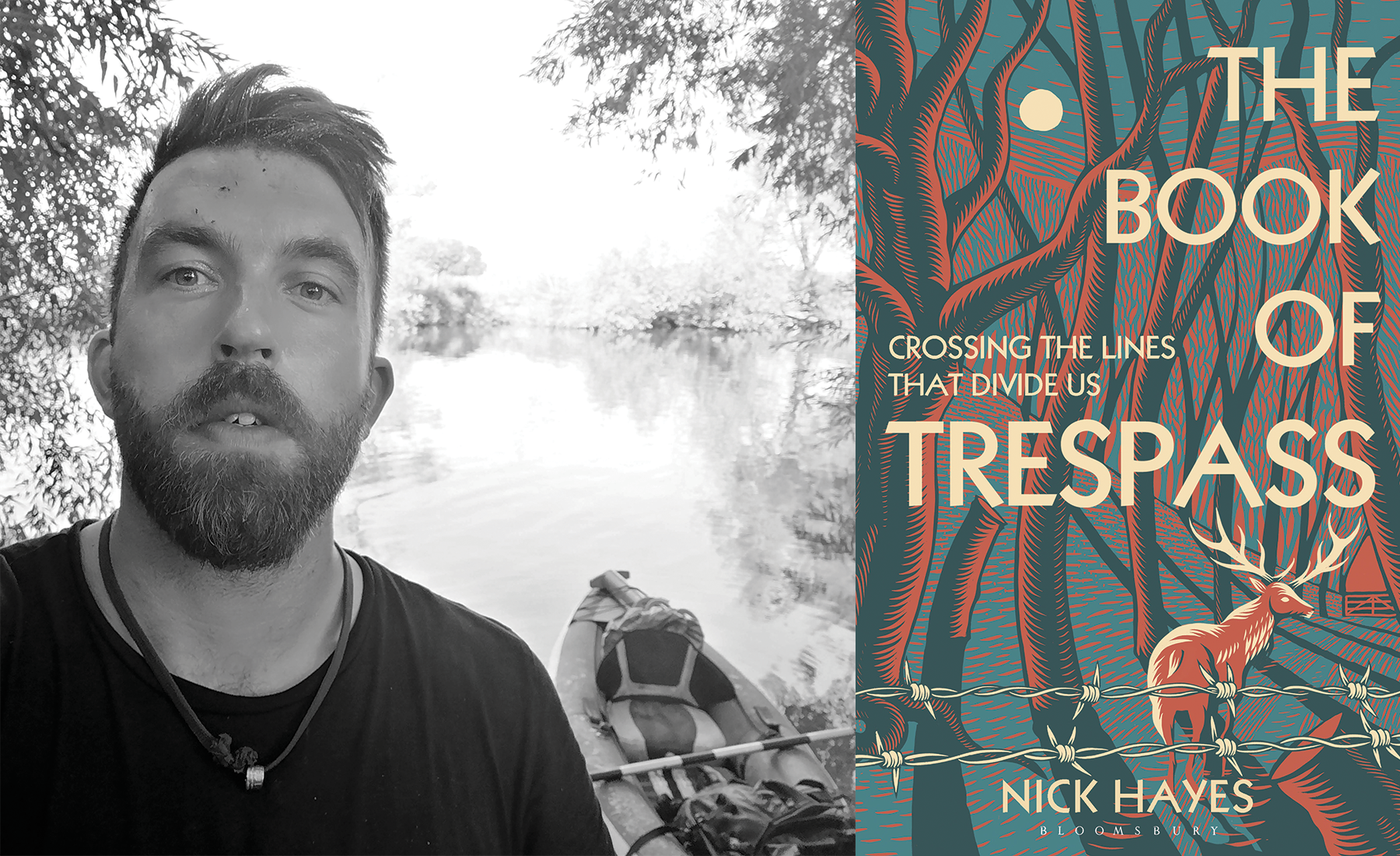
The Book of Trespass by Nick Hayes is out now, published by Bloomsbury
Nick believes that the outdoors should be for everyone, the law of England should not be excluding people from nature but encouraging us towards it. His book pulls together a decade of experience since he started to trespass from more of a political perspective rather than a societal access to nature position. “All I was doing was accessing nature to draw it,” says Nick, who is also a published and successful illustrator, his illustrations feature throughout his book (and in this feature). “All of a sudden the political side is forced upon you when someone comes at you quite aggressively. You realise there is a huge disconnect in what they are doing and how they are interpreting it. Their aggression indicates that you have done something abhorrent and this just didn’t square with me. I know when I am doing something wrong and it didn’t feel like that. It became political when I realised that the entire weight of the law was on the side of a mad description of what I was doing, trespass, and how it is defined as damage.”
Not an offence
Trespass is not generally a criminal offence; however, the Conservative Government are soon to criminalise it. It is being marketed and pitched to us as a way to prevent travellers residing on land without landowner’s permission, however, when you look at the detail you can see that it doesn’t stop at the persecution of travelling peoples, it will also mean the criminalisation of walking (or swimming) on the great majority of England’s land.
“People have been educated to hate on travellers for centuries despite the fact that very few people have actually experienced them,” says Nick.
“You never actually hear the voice of the people from the travelling community, there are issues with their behaviour, but to use the argument of restricting rights to travellers to get people’s vote that will also restrict the rights of everyone in the country is wrong. We need to stand as one. We have been taught to hate on travellers, but anyone could become part of this community. The people whose lives are in vans, boating communities and itinerant workers – there is a huge group of people who have been lumped together with a paranoid projection from the state and fear of nomadism. In our campaign we are appealing to the middle ground, which is a challenge because much of the middle ground are already convinced that travellers are a blight on society. We are saying, ramblers are not criminals, outdoor swimmers are not criminals, kayakers, protesters, climbers, paddler boarders, cyclists… are not criminals, but soon could be.”
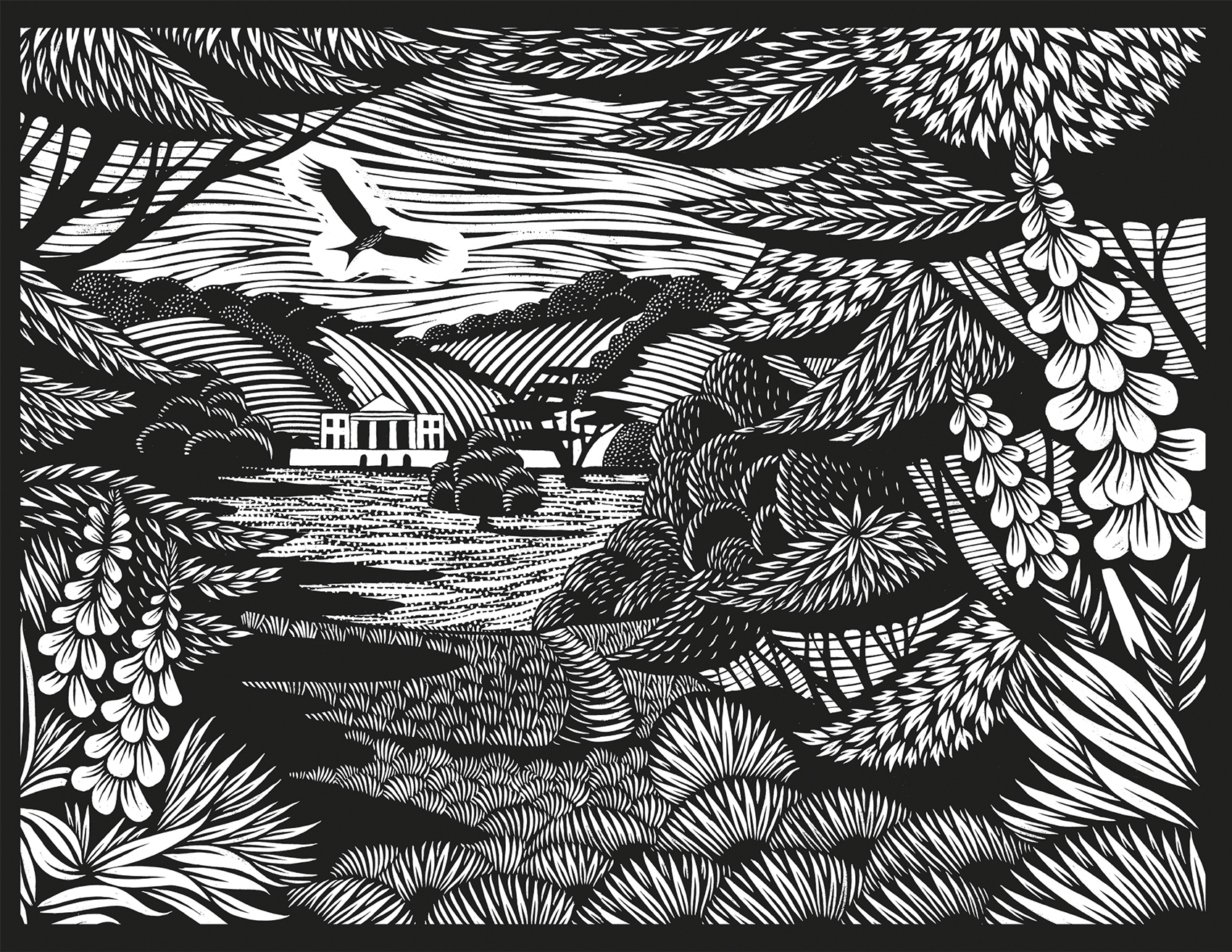
Basildon Park illustrated by Nick Hayes
Improving access
Nick is not looking for a full right to roam and has nothing against landowners. “We want to work with them desperately,” he says. “We hate litter. We are working on the countryside code to make it more moral and inclusive; we want them to support our campaign. We are just pushing to improve access to the most amount of people, 60% of people in England live within easy access to farmland, why not be like Scotland where people have the right to roam on the verges of farmland within very strict parameters of rules of how to act within the countryside?”
Nick and Guy’s Right to Roam campaign is targeting four areas: rivers, woodland, greenbelt and downland, as well as re-education and to ignite a wider understanding of how the countryside should be used. “Lockdown highlighted the direct link between social justice and access to space,” says Nick. “People got a sense of how much they need the outdoors. With the current countryside and right of way acts there is essentially just 8% open to rambling and access depends on how much money you have. If you don’t live next to this land you have to travel to them, maybe stay overnight – add this up for a family of four and it actually becomes pretty prohibitive. Why not open up the nature that is around people rather than just as a holiday destination? This introduces an element of cost and affordability or something you only do for two weeks of the year. People’s health relies on nature being an active part of their lifestyle, there is so much around us, we just don’t feel it because we are told by landowners that England is cramped. England is only cramped because of all the walls that are blocking us from the large amounts of empty space and forgotten about nature. Enclosures happened such a long time ago that we have just embedded the belief in not needing nature – cue mental health crisis, rise in disorders and obesity epidemics. This is England at the moment, and it is all intrinsically connected, give people day-to-day access in nature and watch obesity fall. People love nature, they have just forgotten they can have it because they have been told so many times that they can’t!”
What can you do?
Take action – sign up to righttoroam.org.uk. There are two levels of involvement – sign up to keep updated, join in protest trespassing and spread the message. Or you can share more about who you are, your interests and become part of a local hub system of people and be part of a wider network. Also take the time to sign the government petition to stop the criminalisation of trespass: petition.parliament.uk/petitions/300139





